I am honored to be invited to serve on the EU Platform on Sustainable Finance (EU PSF) for both its first mandate (2020 - 2022) as well as its current ongoing mandate (2023 - 2025). I was appointed with Sergio Carvalho and Agent Green, a leading environmental NGO in Eastern Europe, as a representative of civil society interests.
Let me explain briefly what the EU PSF does. The Platform is a permanent advisory body to the EU Commission that has been established under Article 20 of the Taxonomy Regulation and is subject to the Commission’s horizontal rules for expert groups. The Platform brings together world leading sustainability experts across all stakeholder groups: private stakeholders from financial, non-financial and business sectors, NGOs and civil society, academia and think tanks, experts in personal capacity, as well as public and international institutions. Each Platform mandate, usually renewed every 2 years, establishes new priorities for the group of experts selected to serve. The current mandate of the PSF is to: i) advise on the usability of the EU Taxonomy and wider sustainable finance framework; ii) advise on the technical screening criteria for the EU Taxonomy; and iii) advive on the appropriate monitoring of capital flows into sustainable investments. To find out more about the PSF mandate and all the publications, please follow this link.
Below, I'd like to share the EU PSF publications to which I had an active role in shaping, three of which shaped directly two delegated acts under the EU Taxonomy legislation, related to the technical screening criteria which will be used by c. 49,000 companies falling under the EU Taxonomy / Corporate Sustainability Reporting Directive in Europe going forward. I am forever grateful to my fellow EU PSF colleagues and EU civil servants, from whom I've learnt a great deal and had an enourmous joy working alongside with - you know who you are :).
Policy Publications towards Level 2 Legislation of the European Union
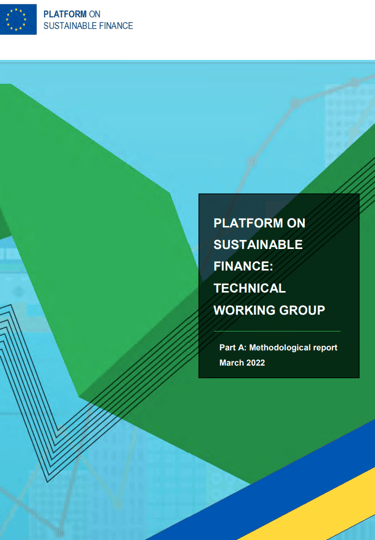

EU PSF Methodological Report on EU Taxonomy Ambition Level and Criteria Setting
The report sets out the headline ambition levels, in a similar manner to the net-zero climate mitigation objective under the Paris Agreement, for the biodiversity, water, pollution and circular economy objectives. The report also provides methodological guidance on how different types of economic activities could contribute substantially or do no significant harm (DNSH) to the four environmental objectives. Finally, in a separate annex, the Technical Working Group detailed its proposals for the technical screening criteria across numerous economic activities.
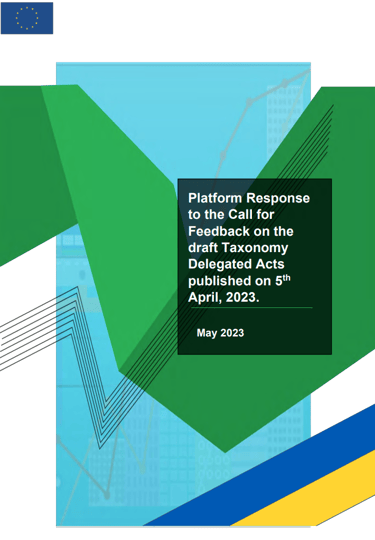

EU Platform Response on the draft Taxonomy Delegated Acts published on 5th April, 2023
On 5th April, the European Commission published the draft Taxonomy Environmental Delegated Act, including seven annexes on: i) water, ii) circular economy, iii) pollution, iv) biodiversity, v), vi) and vii) amendments to the Taxonomy Disclosures Delegated Act; the draft amendments to the Taxonomy Climate Delegated Act, including two annexes on: i) climate change mitigation and ii) climate change adaptation. This briefing provides feedback on both Delegated Acts and the seven annexes. The paper is divided into two sections and three appendices that encompass the Platform´s opinion on: 1. the draft technical screening criteria in the Taxonomy Environmental Delegated Act; 2. the draft amendments to the Taxonomy Climate Delegated Act; and 3. the amendments to the Taxonomy Disclosures Delegated Act.
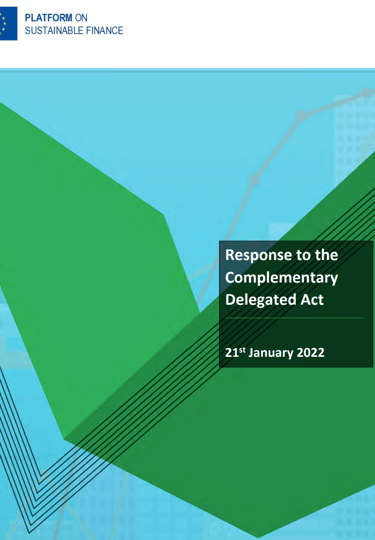

EU Platform on Sustainable Finance. 2022. Response to the Complementary Delegated Act.
On Dec 31st, 2021, the Platform on Sustainable Finance was requested by the Commission to provide feedback on the draft Complementary Delegated Act by January 12th , but then extended to January 21st, 2022. The attached report captures the feedback of Platform Members and Observers. The report focuses in particular on the Commission's proposal to include gas and nuclear power in the EU Taxonomy - the platform provides deep modelling on the climate implications of such decision, particularly for gas, as well as cautions on the do no significant harm implications for nuclear power.
Policy Publications for the Benefit of the European Union
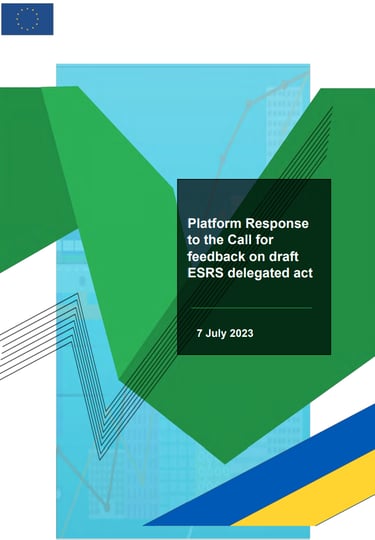

EU Platform on Sustainable Finance. 2023. European Sustainability Reporting Standards
The EU Platform on Sustainable Finance welcomes the opportunity to provide input on the draft Commission’s Delegated Act on the European Sustainability Reporting Standards (ESRS). These standards are vital for ensuring consistent, comparable, and reliable sustainability-related information in line with the objectives of the European Green Deal, the EU Biodiversity Strategy for 2030 and the EU Climate Law. They are of crucial importance in addressing data gaps across the EU sustainable finance framework. The Platform's response is based on five key principles: i) precautionary principle, relevance, consistency, proportionality and applicability.
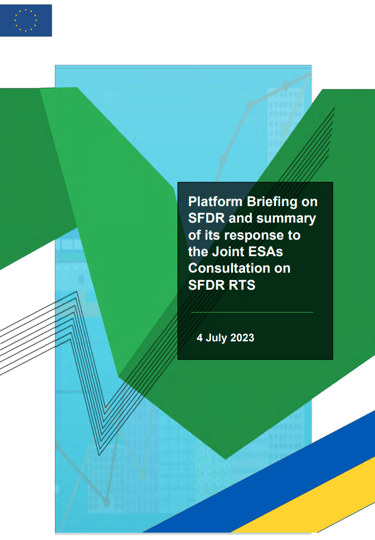

EU Platform on Sustainable Finance. 2023. SFDR Consultation
On 12 April 2023 the European Supervisory Authorities (ESAs) published the draft review of Sustainable Finance Disclosure Regulation (SFDR) Delegated Regulation (EU) 2022/1288 (SFDR RTS) regarding principle adverse impacts (PAI) and financial product disclosures which included a consultation of 43 specific questions. The Platform has responded to the consultation in the official format. The full response and briefing note are included in the download link.
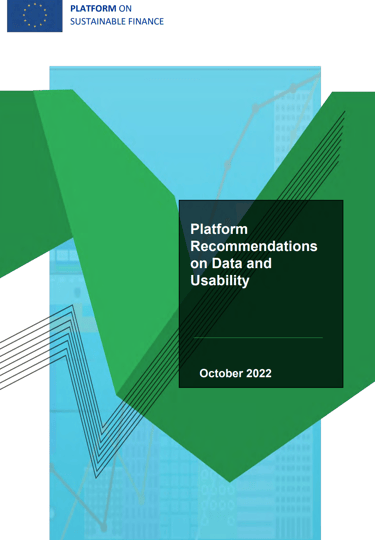

EU Platform on Sustainable Finance. 2022. Recommendations on Data and Useability
The attached summary of recommendations has been prioritised high, medium, low based on the urgency with which they are addressed to support upcoming and implemented Sustainable Finance reporting obligations. These recommendations are not prioritised based on importance or impact. All recommendations should be considered valuable in the usability and application of the Taxonomy Regulation. This report does not address the application of the EU Taxonomy to Small and Medium-sized Enterprises (SMEs) or the treatment of SMEs within financial institutions reporting obligations be it at entity-level or at financial product level.
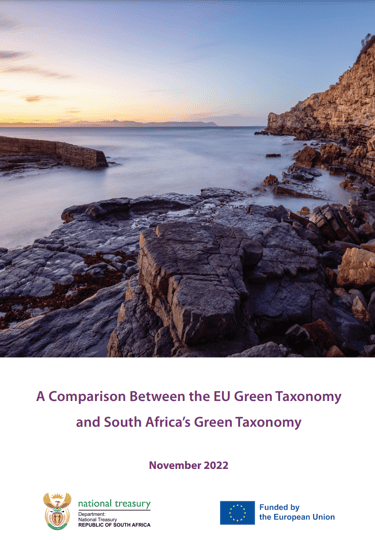

A Comparison between the EU's and South Africa's Green Taxonomy
Both South Africa and the European Union have introduced a common language and a clear definition of what is ‘sustainable’ through a taxonomy, a classification of environmentally sustainable economic activities, at the core of their sustainable finance ecosystem. Sustainable finance taxonomies provide transparency on what can be considered green and, hence, help investors, public authorities and policy makers make informed decisions, avoid greenwashing, and scale up sustainable investment. The purpose of the present report is to provide a comparison between the EU Taxonomy Regulation, including the respective EU Climate Delegated Act and South Africa’s Green Finance Taxonomy as of September 2022. The report seeks to outline the similarities and differences between the two taxonomies to bring clarity and transparency to EU and international investors about investments that could be considered green by both the EU and South Africa.
